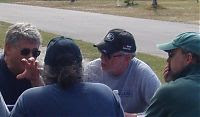
NOTE:
I found an excellent theological analysis of our current economic mess written by Old Testament scholar, Walter Brueggeman, professor emeritus of Columbia Theological Seminary. I am pasting in the first part of the article below. You can access the entire article HERE.
........................
So far as I know, the Bible says nothing explicit about subprime loans and the financial implications of such risky economic practice. There is a great deal, nonetheless, that the Bible has to say about such a crisis as we now face. I will comment in turn on a biblical perspective of an analysis of the crisis and a biblical perspective for an alternative economic practice.
While the specifics of the current market collapse are peculiarly modern, biblical perspectives are pertinent because the fundamental issues of economics are constant from ancient to contemporary time, constants such as credit and debt, loans and interest, and the endless tension between haves and have-nots.
We may identify three dimensions of the theological-moral foundations of the current economic crisis:
AUTONOMY. A sense of the isolated, self-sufficient economic individual is deeply rooted in modern rationality and comes to full expression in U.S. “individualism” that resists communitarian connectedness and imagines the individual person to be the primary unit of social reality. Such an individual is completely autonomous, owes no one anything, is accountable to no one, and can rely on no one except himself or herself.
Such a self (perceived almost exclusively as an economic self) is without restraint and is self-authorized to enact Promethean energy to organize life around one’s own needs, issues, and purposes. The autonomous, self-sufficient self takes as the proper venue for life “the market” and understands the market as a place of self-advancement at the expense of all others who are perceived either as rivals and competitors or as usable commodities.
This same autonomy is articulated in the Bible under the rubric of “the fool” who says in his heart, “There is no God” (Psalm 14:1). The capacity to live without the gift or summons of God has immediate practical implications, for autonomy sets the fool over against the neighbor, most especially the poor neighbor. The one who says in Psalm 10:4 “There is no God” is the one who seeks out neighbors for exploitation: “They lurk that they may seize the poor; they seize the poor and drag them off in their net. They stoop, they crouch, and the helpless fall by their might. They think in their heart, ‘God has forgotten, He has hidden his face, he will never see it’” (Psalm 10:9-11).
.... continued at
www.wondercafe.ca




